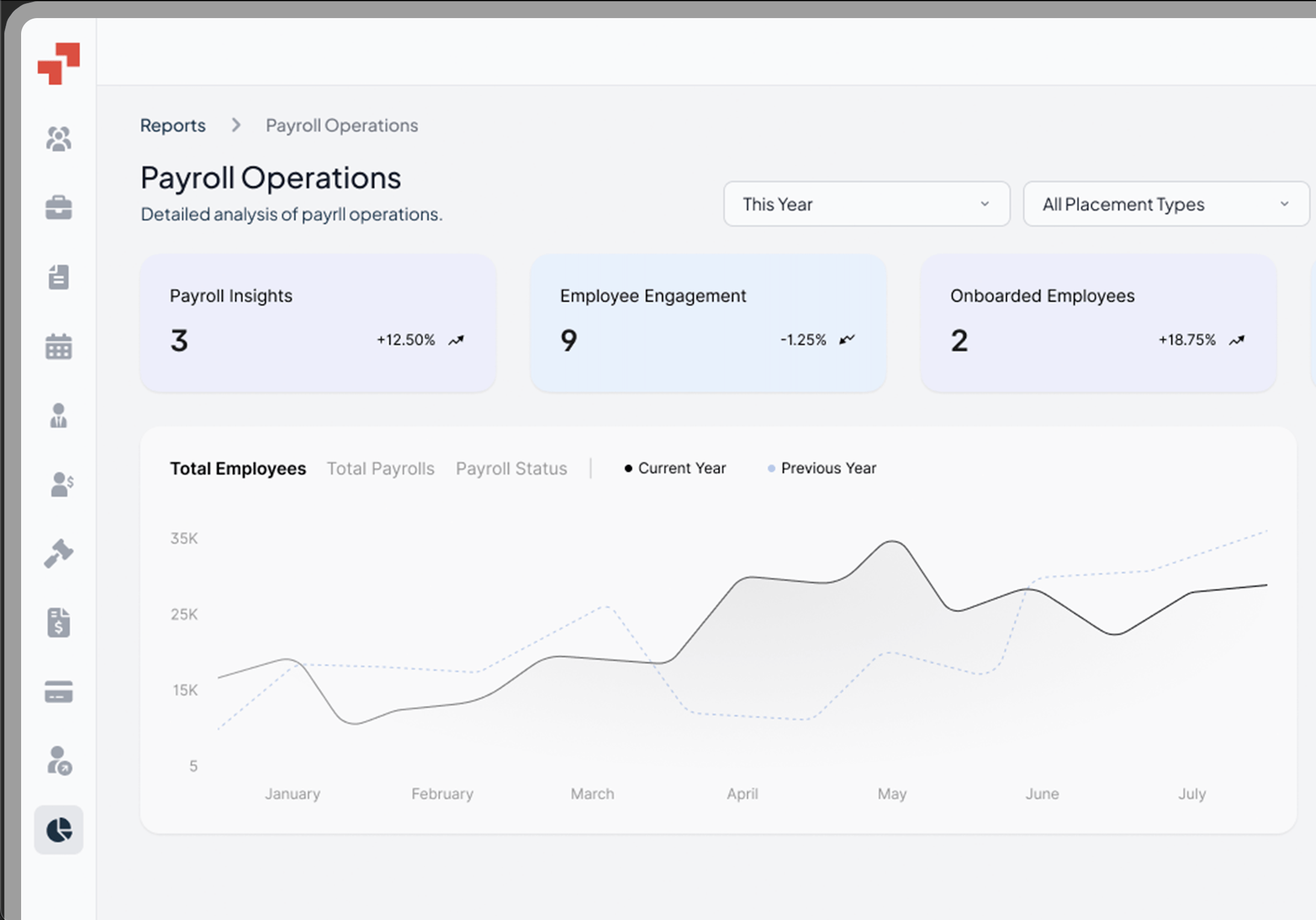Global Workforce GlossaryGlobal Contractor
A global contractor is an independent worker hired by a company to perform services across international borders without being a formal employee.
Unlike traditional employees, contractors manage their taxes, benefits, and working hours, while companies engage them under contract agreements.
Global contractors enable businesses to access specialized skills worldwide, streamline international projects, and reduce overhead associated with establishing local entities. In the US, UK, and EU, contractors must comply with regional employment or labour laws, tax regulations, and social security contributions, making legal compliance essential for cross-border engagements.
Table of Contents
- What is a Global Contractor?
- Global Contractors vs Employees
- Why hire a global contractor?
- How to hire a contractor globally/internationally?
- What are the risks of hiring global contractors?
- How to mitigate the risks of hiring global contractors?
- Should you use an EOR to hire international contractors?
- Examples of global contractors
- Practical Example / Case Study
Global Contractors vs Employees
Employees have fixed salaries, benefits, and labor protections under employment law. Employers control their work, hours, and tasks and handle taxes and compliance. They receive paid leave, retirement contributions, and other workplace protections.
Global Contractors work independently, invoice for services, and manage their own taxes and benefits. They offer flexibility, project-based expertise, and cost-efficiency but lack traditional employee benefits.
Why hire a global contractor?
Hiring a global contractor lets companies quickly access specialized international talent, access specialized skills, and tap into a diverse talent pool without setting up local entities. They offer flexibility, cost efficiency, and cost savings, along with project-specific expertise, making them ideal for startups, SaaS, and tech companies expanding globally.
Pros:
- Flexibility to scale teams quickly
- Access to global expertise and niche skills
- Lower administrative overhead compared to hiring employees
- No long-term benefit obligations
- Ability to engage global contractors for specific projects
- Opportunity to implement innovative solutions through diverse perspectives
Cons:
- Potential compliance and tax risks
- Intellectual property and confidentiality concerns
- Less control over work hours and schedules
- Variability in output quality
Global contractors are ideal for startups, SaaS, and tech companies expanding internationally. With proper contracts and legal oversight, businesses can leverage global skills while mitigating operational and regulatory risks.
How to hire a contractor globally/internationally?
To hire a global contractor, start by identifying the required skills and understanding country-specific regulations in the US, UK, or EU when hiring contractors or a contractor internationally. Engaging global contractors means working with an international contractor or foreign independent contractor, so it’s crucial to understand employment laws and relevant local regulations in both your country and the contractor’s home country to ensure compliance and mitigate risks.
Draft a clear contract detailing project scope, payment terms, and intellectual property rights. Ensure the contractor agreement complies with local regulations, relevant local regulations, and international employment requirements for both parties.
Use secure payment platforms or an EOR service to manage payroll, taxes, and statutory contributions. When you pay contractors or pay international contractors, choose the right payment method and consider using online payment platforms for efficient international payments. Managing payments across borders is a more complex process, requiring you to collect the appropriate tax forms, such as IRS forms for a US company, and consult a tax professional to ensure compliance with tax laws and your own tax obligations.
Conduct background checks and follow GDPR-compliant data handling for EU contractors. Understanding the contractor’s home country regulations and the requirements for a US company hiring a foreign independent contractor or international contractor is essential. Structured contracts and legal compliance help maintain smooth collaboration and reduce risks when engaging international talent.
What are the risks of hiring global contractors?
Hiring global contractors carries several risks: misclassification as employees, especially since worker classification laws vary across multiple countries, can trigger fines, unpaid taxes, tax liabilities, and penalties due to non-compliance with local tax laws. Non-compliance with local labor laws or social security regulations in the US, UK, or EU may result in audits or litigation.
Managing contractors across multiple countries presents additional challenges, such as navigating cultural differences, different legal requirements, and logistical complexities when working with contractors in a different country. Confidentiality breaches, intellectual property disputes, and inconsistent performance are additional risks. Mismanaged contracts or unclear expectations can lead to project delays and financial losses.
How to mitigate the risks of hiring global contractors?
Mitigate global contractor risks by drafting detailed contracts clarifying scope, payment, and IP ownership. Verify employment classification under US, UK, and EU law. Use compliance tools or EOR services to handle payroll, taxes, and social security contributions; having a dedicated team of HR and legal professionals further ensures compliance and helps manage risk across different countries.
Implement NDA agreements, data protection policies, and performance tracking. Regular audits and contractor training ensure adherence to regional labor standards and GDPR requirements. Establish clear communication channels and expectations to prevent disputes.
Structured compliance processes and risk assessments protect companies from fines, legal claims, and reputational damage while enabling companies to safely engage global contractors and benefit from international talent engagement.
Should you use an EOR to hire international contractors?
Yes. Using an Employer of Record (EOR) is highly effective for hiring global contractors because it ensures compliance with US, UK, and EU labor/labour laws, reduces administrative overhead, and mitigates misclassification risks. EORs manage payroll/salary processing, tax obligations, and legal requirements, allowing businesses to focus on growth while accessing international talent efficiently.
Why PamGro stands out:
- Hire anywhere fast: Onboard international contractors in days, not months
- Compliance made simple: US, UK, EU laws and GDPR handled for you
- Stay in control: You manage the work, we handle contracts, payroll, and risk
Examples of global contractors
Global contractor examples include:
- A US SaaS company hiring an EU-based software engineer for a six-month project.
- A UK fintech startup engaging a US marketing strategist for a product launch.
- An EU e-commerce firm contracting a US tax consultant for cross-border compliance.
- Freelance designers, developers, or content creators hired on short-term projects internationally.
- Subject matter experts in technology, finance, or HR for advisory roles.
Global contractors are often sourced through professional networks, which connect clients with verified talent. These professionals may work across multiple countries, adding legal, financial, and logistical complexities to international projects.
Practical Example / Case Study
A London-based SaaS startup needed a US-based cybersecurity expert for a 12-week project. Hiring directly would have required setting up a US entity and managing payroll, taxes, and compliance with IRS regulations. Instead, the company engaged the contractor through a global EOR service. The EOR managed US tax obligations, social security contributions, and GDPR-compliant data handling. The contractor delivered the project on time, boosting the startup’s platform security. The company avoided $50,000+ in entity setup costs, reduced administrative overhead, and mitigated misclassification risks, demonstrating the strategic value of hiring global contractors via an EOR.
Hire the Best Talent, Anywhere






